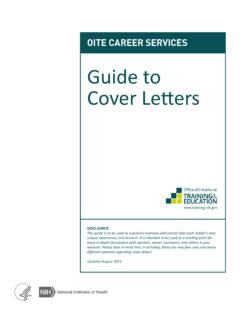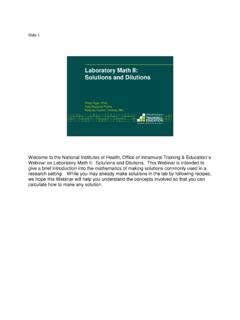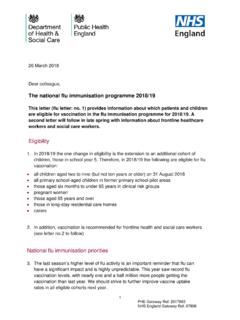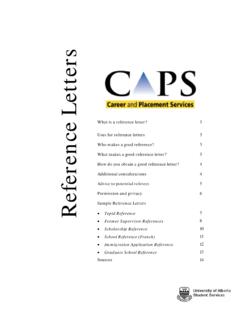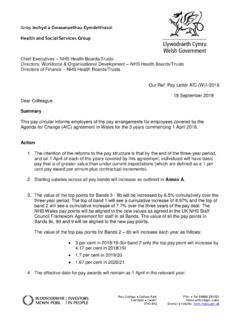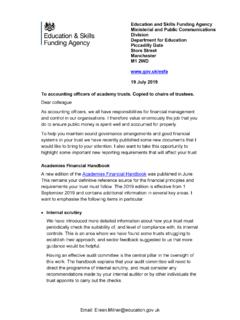Transcription of Guide to Writing Letters for Faculty Positions
1 Guide to Writing Letters for Faculty Positions In the academic job market, your letter of application is an extremely important part of your job application. This letter is the first time you are introducing yourself to a potential employer;. therefore, it should not only describe your research and teaching experience, but also demonstrate your intellect and Writing ability. Successful Letters are those that reflect something more than what is evident in your ; they will give the search committee a sense of your voice, your intellectual capacity, and your enthusiasm and interest in what you do.
2 Successful Letters also indicate that you are job ready that you can start teaching immediately, have a research agenda already underway, and have some sense of what it means to be a fully-functioning Faculty member in your field. Draft your letter over several days or weeks; gather advice from your mentors, advisors, and peers. The better this letter is, the better your chance of getting a first interview. Generally, the letter of application for academic jobs is 1 to 1 1/2 pages in length, and contains 3-5. substantive paragraphs. Letters in the humanities and some social science fields tend to be longer than those in the sciences; check the standard in your field.
3 When in doubt, err on the side of brevity. Length can also depend upon whether additional materials ( , teaching philosophy, research agenda, etc.) are requested as part of the application. The ordering of the body paragraphs on teaching and research may depend on the kind of position you seek; you may want to talk about teaching first when applying to teaching colleges, and research first when applying to research institutions. Elements of a letter Opening paragraph In the opening paragraph, identify the position for which you are applying and introduce yourself briefly to the reader.
4 If you have not yet completed your dissertation, you can indicate when you will receive the here. Teaching paragraph Depending upon where you are applying and what field you are in, write a substantive paragraph about your teaching experience. If the institution is also requesting a teaching philosophy, you still want to reflect your teaching experience and strengths here but you do not need to go into as much detail. Describe how you teach and what you have taught; give specific examples from your classroom experience to illustrate more general points.
5 If you have limited experience, illustrate what you would teach and how, describing specific texts and/or techniques whenever possible. Indicate your willingness or desire to teach the level of students appropriate to the institution to which you are applying ( , at a major research institution, both undergraduate and graduate students, while at a liberal arts college, only undergraduates). Try to make connections between your research and your teaching interests; from the perspective of the search committee, it is impressive when someone has considered (even in a preliminary way) the nature of the connection between the two major strands of academic life in his or her field.
6 If you have interest in or experience with new pedagogies or technologies in the classroom, make sure you note it somewhere in your letter , , or teaching philosophy. Research paragraph Write a substantive paragraph about your research. As in the teaching paragraph, concentrate on specifics, but write in clear, crisp prose and avoid excessive jargon. Keep in mind that you are Writing to a search committee and not necessarily a single specialist in your field. Depending upon the institution, this committee may include members from different departments as well as an academic dean.
7 If you write to the specialist, you may alienate other members of the committee, including those with specialties in other fields within the discipline. Spark the interest of your readers by demonstrating your intellectual vigor and ability to write so that they will want to talk with you about your work during an interview. Lastly, when you describe your project, move away from language like My dissertation explores the problem of industrial expansion in to language like I. argue that the industrial expansion is significant or My work contributes to the field by demonstrating that.
8 This language tells your readers that you are already thinking like a professional and have confidence in your ideas. Closing paragraph(s). You should add a brief paragraph to the end of your letter if you have significant honors, such as a national dissertation fellowship, or if you want to indicate when you will be done with your dissertation. You may also describe significant committee work, or community service, if applicable to your experience and to the position for which you are applying. The standard application letter usually ends with a reminder that your is enclosed and that your dossier is available upon request, and indicates whether or not you will be attending the upcoming professional meeting.
9 If you will be out of town during key periods of the job search, you may also indicate alternative dates and phone numbers where you can be reached. Final tips Before Writing , review the job ad to highlight skills and experiences that will be critical for the successful candidate to possess. Use this information to write your letter by highlighting similar experiences you have had. If possible, address the letter to the appropriate individual by name and professional title. If you are unable to find this information, use a formal title (Director of Search Committee, Chair, Director of Personnel, etc.)
10 Avoid beginning every sentence or paragraph with the word "I.". Open your cover letter with a strong statement. Express enthusiasm about the position you are applying for. Tell why you are interested in the employer. Indicate what you can do for the employer rather than what the employer can do for you. Always proofread to correct spelling and punctuation errors. Both the cover letter and resume or CV must be free of mistakes. There is a counselor available at the Office of Postdoctoral Services to critique your cover letter when you have completed your draft.
